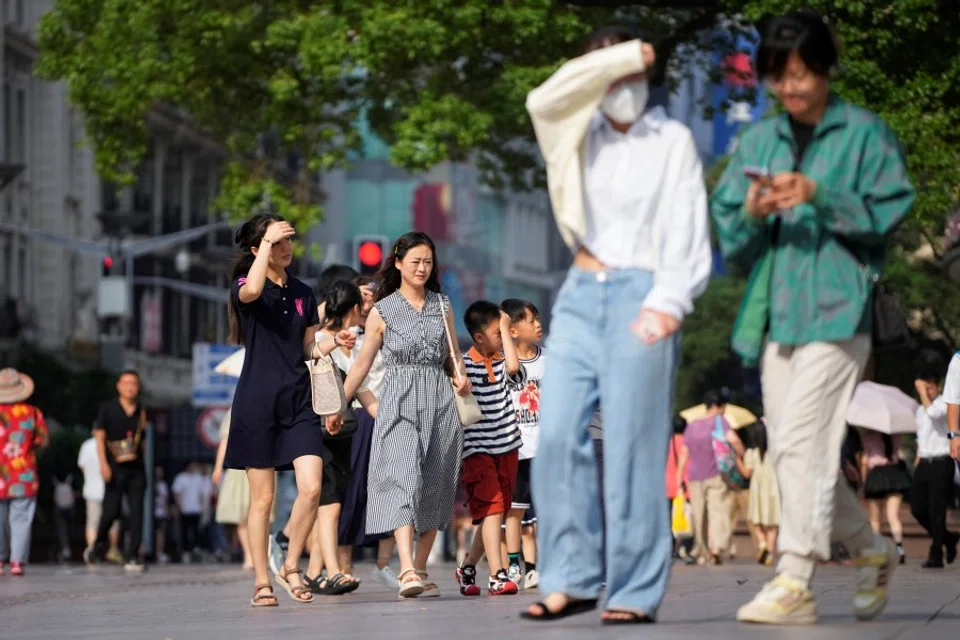Low consumer confidence will dampen China's push to boost consumption
The Chinese government is pulling out all the stops to boost domestic consumption, including a list of 20 measures from the National Development and Reform Commission. However, given that these measures do not include direct funding policies, how effective will they be in getting people to spend?

Last weekend, I took a stroll along Nanjing Road in the heart of Shanghai, and I was shocked by the overwhelming crowd of summer tourists. The street was packed from one end to the other, and police officers were stationed at intersections and subway stations to maintain order. And this was just an ordinary night during the weekend.
At a press conference this week, Li Chunlin, vice-chair of China's National Development and Reform Commission (NDRC), shared a similar anecdote. He caught a midnight screening of the movie 30,000 Miles from Chang'an over the weekend, and he could only get a seat at the side of the cinema as it was a full house.
Consumer sentiment still weak
Such firsthand accounts give the impression that consumer spending in China is flourishing. However, the reality is that following a "revenge" rebound earlier in the year, the total retail sales growth of consumer goods has gradually slowed, with the year-on-year growth rate falling significantly from 12.7% in May to 3.1% in June.
The weakness in consumer sentiment can also be seen on e-commerce platforms. After the mid-year 618 shopping festival, e-commerce giants Taobao and JD.com did not disclose their sales figures or year-on-year growth rates - this is the second year that Taobao did not disclose its total transaction volume.
... the extensive list of 20 measures does not mention cash handouts or consumer vouchers. Instead, the focus is on creating new consumption opportunities and enhancing the consumer experience.

In the first half of this year, final consumer expenditure contributed as much as 77.2% to China's economic growth. As exports weaken due to the impact of external demand, the importance of consumption in driving the economy is evident.
Following measures to promote household spending and auto sales, the NDRC this week announced measures to revive and expand consumption, aiming to stimulate the weak domestic demand by improving consumption in areas such as auto sales, real estate, food and beverage, and cultural tourism.
However, the extensive list of 20 measures does not mention cash handouts or consumer vouchers. Instead, the focus is on creating new consumption opportunities and enhancing the consumer experience. These include implementing a paid vacation system to promote summer consumption, extending the opening hours of museums and amusement parks to encourage nighttime consumption, and improving rural e-commerce and express delivery systems, while getting financial institutions to lower consumer credit rates.

Li Chunlin emphasised that the consumption-boosting policies are not about "emptying wallets" or "overdrawing demand", but rather about helping residents save on expenses and purchase cost-effective goods. Some netizens mocked, "Am I short of cost-effective goods? It's money that I don't have enough of."
Others declared, "If my empty wallet is resolved, I will immediately respond to the call to spend, no need for state stimulus."
Consumption vouchers may not be effective
While the central government has not provided direct financial subsidies, some local governments have taken it upon themselves to distribute consumer vouchers. This week, Nanjing, Hainan, Shenzhen and Shanghai issued consumer vouchers to boost cultural tourism, shopping and sports consumption, while the Jiangxi provincial government announced that it will allocate 100 million RMB (US$14 million) in provincial business funds in the second half of the year for the distribution of consumer vouchers.
But at the same time, the audit reports released by various local governments showed that consumption vouchers issued in recent years had not only been misused, but also did little to drive consumption. For example, four regions in Guangdong mismanaged the distribution of consumer vouchers; in Hainan, over 70% of the 8 million RMB worth of distributed consumption vouchers remained unused. Although Shandong's Wucheng county arranged a budget of 10,000 RMB, the actual expenditure was only 935 RMB, and it benefited only three merchants.
China's new household deposits increased by 17.84 trillion RMB last year, nearly double that of the previous year.

Some analysts believe that compared to the size of China's economy, the amount of consumption vouchers issued by local governments has a very limited effect. Others think that consumption reflects long-term confidence - without a solid foundation, handing out money is but a temporary solution.
Is there still consumption potential among the Chinese people waiting to be unleashed? It appears so based on household deposits alone.
China's new household deposits increased by 17.84 trillion RMB last year, nearly double that of the previous year. However, during the same period, China's consumer confidence index plunged to a record low and income confidence fell, suggesting that the increase in savings was achieved under the conditions of slow income growth and low willingness to spend and invest. Furthermore, the added risks in the real estate market last year affected people's willingness to purchase homes.
Boost confidence first
Although the pandemic's impact on consumption has diminished somewhat this year, the Chinese economy still faces serious headwinds and people remain pessimistic about the country's outlook and worry about declining income. Thus, experts' previous forecasts of "revenge spending" among the public and homebuyers proved to be unsustainable.
Based on the latest consumption data, Guo Lei, chief economist at GF Securities, estimates that the country is showing the weakest - and still declining - consumption in building renovations and daily necessities, due to weak real estate sales and income confidence respectively.
At the end of the day, the Chinese lack neither consumption potential nor willingness to spend, but confidence in the future.

At the end of the day, the Chinese lack neither consumption potential nor willingness to spend, but confidence in the future. Asking ordinary folks to spend their rainy-day funds on entertainment, houses and cars is neither realistic nor reasonable.
The various policies aimed at boosting consumption can only superficially improve consumption experience. The consumption vouchers issued by various local governments are also a futile attempt at increasing consumer confidence. To unleash consumption potential, more must be done to guarantee employment and increase income so as to dispel the public's uncertainty about the future or worries that spending will empty their wallets and overdraw future demand.
During their July meeting, the Politburo of the Chinese Communist Party pledged to make stabilising employment a strategic focus with all things considered, expand consumption by boosting residents' incomes, and drive effective supply by boosting end consumption.
Indeed, this shows that China's decision-makers have realised the problem. Next, we shall wait and see what series of policies authorities will roll out to boost the people's ability and willingness to spend, and revitalise this huge consumer market.
This article was first published in Lianhe Zaobao as "难促的消费".
Related: China's first half GDP growth: Has the economy bottomed out? | Beijing unrattled despite weak Q2 | No need for large-scale stimulus amid China's stable growth | Chinese platform economy gets vote of confidence from government | Shanghai's falling property prices indicate economic gloom in China





![[Photos] Fact versus fiction: The portrayal of WWII anti-Japanese martyrs in Taiwan](https://cassette.sphdigital.com.sg/image/thinkchina/3494f8bd481870f7c65b881fd21a3fd733f573f23232376e39c532a2c7593cbc)